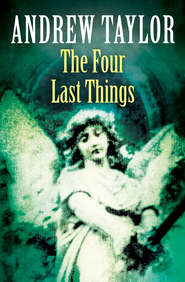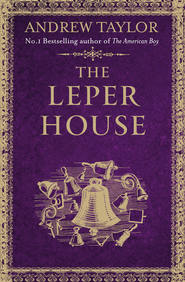По всем вопросам обращайтесь на: info@litportal.ru
(©) 2003-2024.
✖
Fallen Angel
Автор
Год написания книги
2019
Настройки чтения
Размер шрифта
Высота строк
Поля
Miss Oliphant’s books lay before her on the duvet: unfinished business that would normally have nagged Sally until she had dealt with it. She touched their covers one by one with the fingertips of her right hand. The Bible. The Prayer Book. The Religio Medici. The first two were bound in worn black leather, dry with age, their spines cracking and in places breaking away from the covers. Sally knew without looking that the paper would be so thin that it was almost invisible, and that the type would be so small that even someone with 20:20 vision would have an effort to read it. The Religio Medici had a larger typeface but the book was as battered as the others. All three smelled musty: tired, repulsive and unwashed. Sally shivered, reluctant to open any of them. Each book might be a miniature Pandora’s Box full of unexpected evils.
‘You mustn’t blame yourself,’ David Byfield had told her on the telephone.
‘Then who else do you suggest? God?’
There was a silence at the other end. Then David said dryly, ‘The person who took Lucy, perhaps.’ He had overridden her attempt to interrupt. ‘Concentrate on this: you mustn’t worry about Michael. He’ll sleep it off tonight and be with you tomorrow. You mustn’t blame him, either, or yourself. Do you understand, Sally? It’s most important. Nor must you stop hoping and praying.’
‘I can’t pray.’
‘Of course you can.’
‘Listen,’ Sally began, ‘I don’t like –’
‘Don’t argue. Pray, go to bed and try to sleep. That is the best thing you can do.’
David Byfield’s voice had sounded unexpectedly youthful over the phone. Like Derek Cutter, the old man had been in full pastoral mode, but his technique differed completely from Derek’s: the former’s had made her squirm; David’s infuriated her. Talk about arrogant, Sally thought. What did he know about losing a child? The autocratic, patronizing bastard: who had given him the right to give her orders? She glowed with anger at the memory. Only then did it occur to her that David might have intended to achieve just that effect. He was a clever man, she conceded: an old fool, but still clever.
Her eyelids drooped, she slid down the bed. Endowed with a life of their own, her fingertips continued to stroke the binding of the three books. Audrey Oliphant, she thought sleepily: that’s a strange name. Oliphant sounded like elephant. Had there once been a saint called Audrey? Then, as sudden and as violent as a flash of lightning, the knowledge that Lucy was not there slashed across Sally’s mind. She sat up in bed and screamed. But the sound which came out of her mouth was no more than a whimper. She sank back against the pillows.
The movement had dislodged the books. The corner of a piece of card protruded from the Religio Medici. Sally pulled it out. It was a postcard of the west front of a great church, an old-fashioned colour photograph bleached with age. The building was familiar, but for the moment her mind refused to produce the name. She flipped the card over: Rosington Cathedral. There was writing, too. She squinted at the postmark. April 1963? 1968? It was addressed to ‘Miss A. Oliphant, Tudor Cottage, The Green, Roth, Middlesex’. The name Roth was faintly familiar. Somewhere west of London? Near Heathrow Airport? She tried to decipher the message.
Too many tourists and more like Feb. than April but choral evensong was super. Our mutual friend still remembered. Small world! See you on Tuesday. Love, Amy.
A glimpse of other lives, Sally thought, of a time when Audrey Oliphant had perhaps been happy. Why do we even bother to try?
The card slipped from Sally’s hand, and she sank into sleep. Thanks to the tablets she lay there for what she afterwards discovered was almost seven hours. For much of the time she moved restlessly through the dark phantasmagoria of her dreams, searching for Lucy. This must be hell. When she awoke, she swam up from a great depth, painfully conscious of changing pressure and a desperate need to reach the surface.
Lucy.
Still with her eyes closed, she made an enormous effort and gathered together the pain, the fear and the anger. She made a ball of it in her mind and kneaded it like dough. The ball was streaked with colours: red, brown, green and black, the colours of the emotions. She picked it up and threw it over her shoulder. Then she found the strength to open her eyes.
The bedroom was in darkness, apart from a band of light from the streetlamp slipping between the curtains and the red digits glowing on the clock display. Her pulse was racing, her mouth was dry and her eyelids were swollen and sore.
No Lucy, she thought, and no news of her either: they would have woken me.
Something had driven her awake. She had fled to consciousness as if to a refuge. Had something down there been even worse than this waking knowledge of Lucy’s absence?
It was six-fifteen. She switched on the bedside light. Judith must have come in to turn it off last night. Miss Oliphant’s books were in a neat pile on the bedside table. Sally lay back on the pillows, fighting the despair that threatened to overwhelm her. She tried to pray: it was no use – the lines were down, the airwaves jammed, or perhaps no one was bothering to answer at the other end. Pray, David Byfield had told her; pray and hope. She could do neither.
Gradually, fragments of her dreams slipped into her conscious mind. She glimpsed Miss Oliphant, attired in episcopal robes, standing in front of the high altar of a great church, which Sally knew must be Rosington Cathedral. Miss Oliphant was reading the Service of Commination from the office for Ash Wednesday in the Book of Common Prayer. Is that why they’ve taken Lucy, because we were cursed? But there are no woman bishops, Sally remembered thinking in her dream, not in this country. Have they changed the rules and not told me? In the dream world this possibility had been far more unsettling than the sight of Miss Oliphant, last seen dead in a hospital bed, apparently alive and well.
Another fragment of another dream had concerned David Byfield. He had seen an angel flying low over Magdalene Bridge in Cambridge.
‘Real feathers,’ he insisted to Sally and Michael, ‘rather like a buzzard’s.’
‘But Lucy’s missing!’ Sally shouted.
‘This is far more important.’
In a different part of the same dream, she and Uncle David were in a police station that smelled like a public lavatory. Chief Inspector Maxham leaned across the counter towards them, sucking in his breath, the air hissing between his tongue and his teeth.
‘Couldn’t have been an angel, sir. Angels don’t exist.’ Sally was embarrassed. Grown men did not believe in angels. David became very angry with Maxham.
‘Don’t be naive, Officer. You’re not competent to make wild assertions like that.’
The chief inspector smiled, revealing Yvonne’s perfect teeth. ‘You were dreaming.’
‘I was not.’
Uncle David raised his arms and spread them wide. To her horror, Sally saw that his dark clerical suit was sprouting two rows of silvery-white feathers, one for each arm, running down the sleeves from shoulder to cuff. Uncle David was growing wings.
By eight o’clock, Sally had showered, dressed and had breakfast, which in her case consisted of three cups of coffee. She and Judith sat at the table in the living room. Judith tried to entice Sally’s appetite from its hiding place by filling the flat with the smell of toasting bread and boiling herself an egg.
‘No news is good news.’ Judith’s face creased with anxiety, and Sally felt guilty for spurning all those good intentions. ‘Why don’t you have a spoonful of cereal – something light like cornflakes?’
Sally reached for the coffee pot. ‘Perhaps I’ll have something later.’
‘I expect you’ll want to go to church this morning. I’m sure Yvonne will drive you.’
Bugger church. ‘I don’t want to, thanks.’ Sally glimpsed, or imagined, hurt surprise in Judith’s eyes. Bugger Judith. But it wasn’t that easy to slough off the habit of being considerate. She heard herself saying soothingly, as if Judith, not herself, were the victim: ‘It’s kind of you to think of it, but I want to be here when my husband comes home.’ With his slippers warming by the fire, the newspaper on the arm of his chair and fresh tea in the pot? ‘And of course there might be some news.’
‘I do understand.’ Some of Judith’s creases vanished. ‘Won’t be long now, will it? It will be easier with the two of you.’
Sally nodded and sipped her coffee. She doubted if it would be easier when Michael came. Nothing could be easy without Lucy. In the second place, there wouldn’t be just the two of them because David Byfield was coming up to London, too. In the third place, Michael, much as she loved him, was likely to create more problems than he solved. He habitually repressed his emotions, which meant when they did come to the surface they tended to be under great pressure and boiling hot.
‘I wonder if the newspaper’s come,’ Sally said, her eyes meeting Judith’s.
‘I’ll see, shall I?’
Before Sally could protest, Judith was on her feet and moving towards the door. A moment later she returned with the Observer.
‘Would you like me to …?’
Sally held out her hand for the newspaper. ‘I’d rather find out myself.’
The story was confined to a few paragraphs on one of the inside pages. Lucy Appleyard, four, had disappeared from her child minder’s; the police had not ruled out the possibility of foul play. Chief Inspector Maxham provided a guarded comment, which in effect said no more than that the police were investigating.
‘The whole parish is praying for Lucy, Sally and Michael,’ Derek Cutter had told the Observer‘s reporter. ‘Sally’s a marvellous curate. She’s already made her mark at St George’s.’
Sally pushed the newspaper, open at the story, across the table. Judith read it quickly.
‘Fair enough, I suppose,’ she said brightly.
‘I wonder what the tabloids are saying.’ Sally winced. ‘Perhaps it’s better not to know.’
A key scraped in the lock of the door to the landing.
‘That’ll be Yvonne.’ Judith gathered up her handbag, and risked a small joke. ‘Just in time for the washing-up.’











